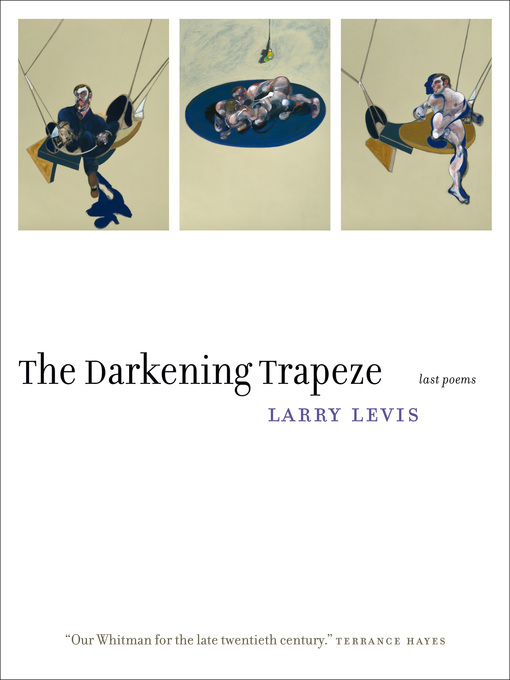
The Darkening Trapeze
Last Poems
کتاب های مرتبط
- اطلاعات
- نقد و بررسی
- دیدگاه کاربران
نقد و بررسی

December 21, 2015
Levis (1946â1996) has been absent from this Earth for nearly 20 years now, but you wouldn't know it by the profusion of current writers that honor him daily by poring over his books, studying his wildly ambitious poems, and trying, only to fail beautifully, to write like him. An undisputed poetic master, Levis inspires an almost cult-like obsession in those introduced to his poems. Perhaps this fandom is also fed by the fact that, because he died so young (at age 49), many of us can't help but greedily wonder what his poems would look and sound like if he were still writing now. While it cannot free Levis from his chasm of stopped time, this new volume offers an extraordinary look at the never-before-published works of this much-loved poet. Expertly edited by poet David St. John, his longtime friend, the Levis we know and admire from Winter Stars, The Widening Spell of Leaves,, and Elegy is clearly evident hereâbut make no mistake about it, this book is its own solitary, seething beast. Each of its five sections unveils a mind at once lit by imagination and wounded by the brutal work of survival. There are moments of an almost desperate hopefulness, where the poems seem to beg for light, but Levis is always keenly aware of the inescapable shadow of death. In "New Year's Eve at the Santa Fe Hotel, Fresno, California," he writes, "Someday I won't/ Be home to anyone. Some days, it takes/ Two hours of careful talk before I'm me/ Again." In "Twelve Thirty One Nineteen Ninety Nine" (a date he never lived to see), he writes, "Excuse me, but at the end of our complete belief,/ Which is what you required of us, don't we deserve// A good belly laugh? Don't we deserve// A shout in the street?"
This is a book in which hope is only delivered in increments, slowly and under the door, so you don't forget where you really live. But that's not to say the book is bleak; it's not. Instead, it's a book that lives in the shadows and doesn't pretend that we all don't. Despite his lyrical genius and mythic poems influenced by art, film, and music, Levis still risks saying things plainly without any false promise of transcendence (which is, after all, why we trust him). In "A Singing in the Rocks," he writes, "Not that a singing could have changed either one of us." In the long, achingly triumphant poem that feels like the central blaze of the book, "Poem Ending with a Hotel on Fire," he doesn't allow for solace in facts or memory, but instead writes, "And that// Is what it has become:// Having to imagine, having to imagine everything,// In detail, & without end."
It's precisely that dark honesty that makes this book so riveting, marking the posthumous return of a literary hero who is only heroic because he's come back to tell us the awful truth: nothing will keep us alive and nothing will make it better. Until, somehow, he does come to life again with words. "Besides" he writes, "It's still winter everywhere & maybe you want to hear a story." (Jan.)
Ada Limón is the author, most recently, of Bright Dead Things(Milkweed Editions),
a finalist for the 2015 National Book Award for Poetry.

Starred review from January 1, 2016
"This life & no other" opens the poem "La Strada," and that phrase is emblematic of Levis's powerfully reflective final work. Published 20 years after the poet's death, it collects poems held back from 1997's posthumous Elegy as thematically distinctive. This volume is edited by St. John, who explains in an afterword that these poems set themselves apart as mostly "longer, operatic, and at times wildly ambitious." Indeed they are, though not for being over-the-top experimental or baroquely conceived. Levis writes quietly yet with grand, persuasive intent about what we stare down at the end--what it all means. He dismisses fatefulness and control ("The town we tried to change, changed anyway") or any weighty sense of importance ("the saint's relic like something obliterated// By the cries of another century--are there// To show how little they matter"). But the writing isn't grim; there's a peaceable acceptance that simply cannot be called world weary. "Sparrows gathering in one small tree, / Their throats full of some ridiculous/ Joy or misery at being sparrows," says Levis in a striking passage that highlights both his ethics and his aesthetics, the world plainly viewed but for a slight tilt. That "ridiculous" is fabulous. VERDICT A highly recommended capstone to a singular career.--Barbara Hoffert, Library Journal
Copyright 2016 Library Journal, LLC Used with permission.

























دیدگاه کاربران